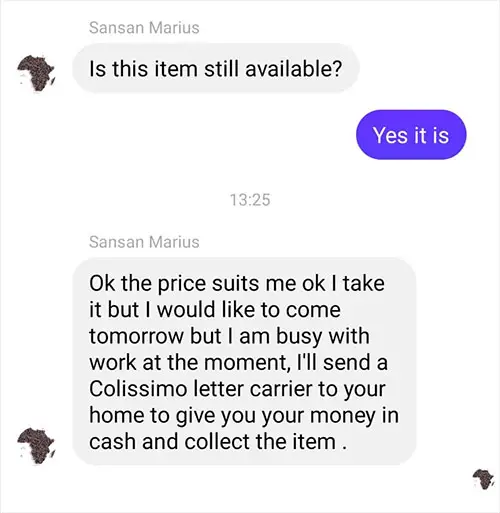Beware Facebook “Colissimo” Marketplace Scam
We describe how scammers are targeting Facebook users selling on Marketplace by claiming they’ll use courier services like Colissimo to send the seller their money.
Many of us turn to Facebook to get rid of unwanted items using the social network’s powerful Marketplace platform. But where there are people buying and selling items, scammers will never be lurking too far away.
The courier scam begins when a Facebook user trying to sell an item using Marketplace is sent a message asking if their item is still available. Upon agreeing to sell the item, the seller is then told by the potential buyer that the buyer can’t meet the seller in person and will instead send the seller the cash in an envelope using a courier company, and the courier company will then pick up the item.
In the example below, that courier company is Colissimo, thought other popular versions including UPS.

Ok the price suits me ok I take it but I would like to come tomorrow but I am busy with work at the moment, I’ll send a Colissimo letter carrier to your home to give you your money in cash and collect the item.
Let’s be clear. This is a scam. Whenever a potential buyer claims they will send cash using a courier company, that is the Marketplace courier scam.
It is designed to entice the seller since, after all, if a courier comes to their front door with an envelope full of cash, then it seems like a win-win situation, with the buyer taking on all the risk.
Sponsored Content. Continued below…
However not all is at is seems, because if the seller agrees, the buyer – who is a scammer – then goes on to explain that the seller will need to go online first and pay the courier company some type of “insurance payment” to deliver the cash in order to proceed. The buyer claims they will add extra money into the envelope to cover the costs of the insurance payment so the seller doesn’t lose out.
This is the crux of the scam. The scammer isn’t really using a courier company. If the seller agrees, the scammer sends a phishing email that links to a malicious website asking for the “insurance payment”, and any payment details entered into that spoof website are stolen and sent to the scammer.
And needless to say, no courier company or cash stuffed envelope will be making its way to the seller. The seller, on the other hand, will risk being the victim of identity theft.
As soon as the subject of cash stuffed envelopes and courier companies come up when selling on Facebook Marketplace, we recommend stopping the chat, because you’re being scammed.
Always stick to reputable and trusted forms of payments. With Facebook Marketplace this typically means hand-to-hand (doorstep) transactions. Never provide people on Facebook with sensitive personal or financial information because you never know the person you’re speaking to is the real deal.
Sponsored Content. Continued below…
Avoiding this Scam…
- The simplest way to avoid this scam is to be on high alert whenever a prospective buyer mentions sending you money using a courier company like Colissimo.
- Never pay the buyer or any entity referred to you by the buyer when selling an item using free services like Facebook Marketplace and Gumtree.
- Any request by the buyer to make a payment of some kind (such as the above example’s “insurance costs”) using money wire services, services like Venmo or by using gift card vouchers will be scams.
- Remember, just because an email appears to come from a company, it doesn’t really mean the company sent it. Avoid clicking on links in emails and if you do, always ensure the resulting webpage is on the correct web URL. (More about spotting phishing URLs can be seen in our post here.)
- Watch out for sellers using broken English, since many of these scams originate from non-English speaking countries.
- Stick to popularly used payment methods. If selling local, then doorstep collection may be your best bet. If you prefer online payments then PayPal is a good choice. Don’t accept unusual payment methods such as mailed checks, money wire transfers with services like Western Union and courier companies.
Continued below...
Thanks for reading, we hope this article helped, but before you leave us for greener pastures, please help us out.
We're hoping to be totally ad-free by 2025 - after all, no one likes online adverts, and all they do is get in the way and slow everything down. But of course we still have fees and costs to pay, so please, please consider becoming a Facebook supporter! It costs only 0.99p (~$1.30) a month (you can stop at any time) and ensures we can still keep posting Cybersecurity themed content to help keep our communities safe and scam-free. You can subscribe here
Remember, we're active on social media - so follow us on Facebook, Bluesky, Instagram and X
